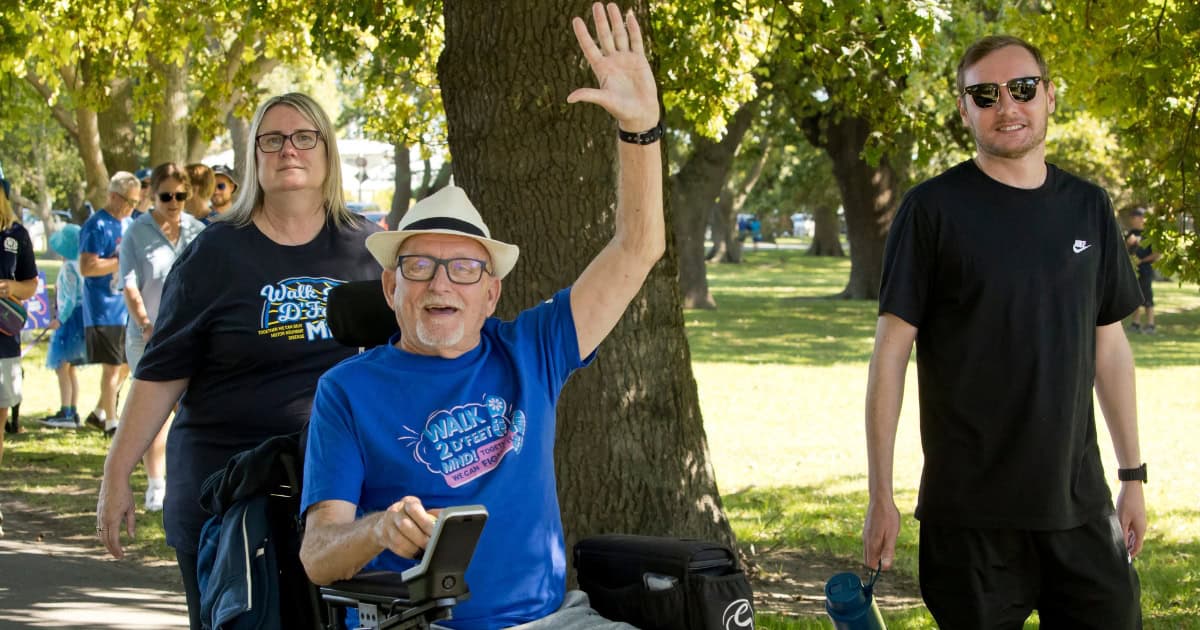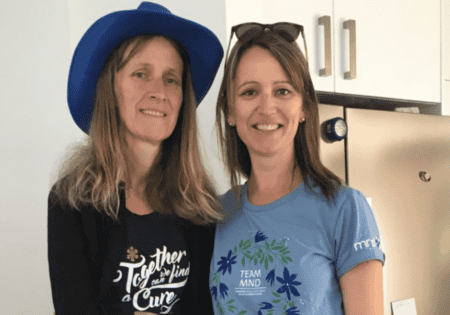From diagnosis to determination: Wayne’s journey with MND
Community, Living with MND
4 August 2025

Wayne Richards is one of many New Zealanders living with motor neurone disease (MND) — and one of many who show us what resilience really looks like. We’re sharing Wayne’s story to highlight the everyday strength, humour, and perspective that shape our community. His message is simple but powerful: tough days don’t take away who you are.
Diagnosed with MND at 70, Christchurch local Wayne Richards shares how family, humour, and positivity help him live fully in the present. “Motor neurone disease is part of my life,” he says, “but it doesn’t define me.”
Wayne Richards has lived a full and varied life. Born and raised in Christchurch, he spent decades working in the printing industry, beginning as a teenage apprentice who fixed typesetting machines and eventually becoming an expert in electronics as the trade modernised. But it was people—not machines—that always mattered most.
“My family and friends have always come first,” he says. “I’ve got five kids, and they filled big chunks of my life. I loved entertaining and doing things with them. I’ve always been social, always busy.”
Sport was another passion. Wayne describes himself as a “typical Kiwi boy” who loved rugby and snooker and later supported his sons in their own sporting pursuits—one even represented New Zealand in futsal. “I’m an armchair critic now,” he jokes, “but back in the day, I tackled the biggest guys on the field and bowled them over.”
Wayne spent his weekends tinkering in the garage, building things with his hands. “I liked to keep busy. I always had some project on the go, whether it was working on cars, DIY around the house, or helping friends with odd jobs,” he says. “I’m not one for sitting still.”
Wayne was 70 when he was diagnosed with motor neurone disease. Looking back, he remembers the small signs—a limp, trouble walking, and one oddly symbolic moment: “I used to joke around with my partner, Sharon, while making the bed, jumping on it like a gymnast. One day, I realised my feet wouldn’t leave the floor.”
His GP noticed something off in his gait and referred him to a neurologist. What followed were months of tests. “They did all these electrical tests on my arms and legs, and finally the neurologist sat me down and told me straight out: ‘You’ve got motor neurone disease.’ I didn’t even know what it was. I felt numb.”
That day, Wayne had a family funeral in Dunedin. “I was in shock, but I had to get on with it,” he recalls. “My partner Sharon drove, and I sat in the car, ringing my kids one by one. I can’t remember the trip—it was a blur of phone calls and emotion.
“When we got back from the funeral, Sharon organised a family meeting. We stood in the middle of the room, hugged, and cried like babies.”
Choosing to live, not just cope
Rather than dive into research, Wayne chose a different route. “My daughter and Sharon found out everything we needed to know. I decided I didn’t want to sit and read screeds of stuff about MND. I live with it every day. It’s not the whole of me.”
That philosophy flows through everything Wayne says. “I’m living the best life I can. I’ve still got a normal life to live—well, as normal as I can. And I meet other people with MND through the support group here in Christchurch. We give each other a bit of a lift.”
Wayne is now 74. He lives independently, supported by daily visits from Sharon, and he sees his children every week. Mobility is his biggest challenge. “I’m a furniture hopper around the house,” he laughs, “but I use a power wheelchair when I’m out.” He sold his red BMW to buy a van that can carry the chair. “That’s how you adapt,” he says simply.
His home is a place of independence and pride. “I love being able to still do things for myself. Even simple stuff like getting a meal ready or pottering about—it makes you feel you’re still living your own life.”
He still cooks his own meals when he has the energy, and Sharon and his daughter help fill the freezer for days when he doesn’t. “I’m a bit pedantic,” he admits. “I like my Ts crossed and my Is dotted.”
It’s a detail that reflects Wayne’s lifelong curiosity and care. In his early years, he fixed mechanical typesetting machines. When the printing industry shifted to electronics, he taught himself to keep up. During lockdown, he took up model shipbuilding again, though he laughs that his first effort was such a mess he gave it away.
“One thing about MND,” Wayne says, “you learn to laugh at yourself. Otherwise, you’d cry. You’ve got to keep a sense of humour. It’s essential.”
Wayne is a familiar face in the Christchurch MND support group, especially for people who are newly diagnosed. “We’re like a family of strangers,” he says. “It sounds weird, but it’s true. When someone new joins, I try to meet them with a positive face. I like to crack the odd joke and make people feel at ease.”
The power of perspective
What does resilience mean to Wayne?
“It means being able to bounce back. To pull yourself out of dark places. You won’t have great days every day, but if you can enjoy the ones you do, that’s something.”
Wayne is realistic about the challenges but refuses to let them define him. “Sure, there are tough days. Days when you’re frustrated or sore or tired. But they’re just days. They don’t take away who you are.”
His message to others facing MND is simple: “Do the best you can, every day. Keep fighting the good fight. Everyone finds their way to cope.”
Wayne credits his outlook to his mum. “She was open, joyful, and liked a laugh. I think I got that from her.”
Family remains his anchor. “I see my daughter every day. I talk to my other kids and grandkids all the time. They give me strength, even just hearing their voices.”
As for what he hopes people take from his story?
“I hope it helps make things better for others. That it shows MND is only as scary as you let it be. I go head-on at things, just like I did with the 6ft 6 prop I used to tackle on the rugby field. Head on. Otherwise, you die.”
At the heart of Wayne’s story is a simple but powerful truth: while motor neurone disease has changed aspects of his life, it has never taken away the man he is—resilient, independent, and endlessly determined to live with humour, dignity, and love.


